Hospitality Consumer Behaviour & Insight: Analyzing Trends & Factors
VerifiedAdded on 2023/06/18
|13
|4227
|345
Report
AI Summary
This report provides an in-depth analysis of consumer behavior and insights within the hospitality sector, focusing on the Stafford Landon hotel as a case study. It explores various cultural, social, personal, and psychological factors that influence consumer behavior and attitudes, highlighting the im...
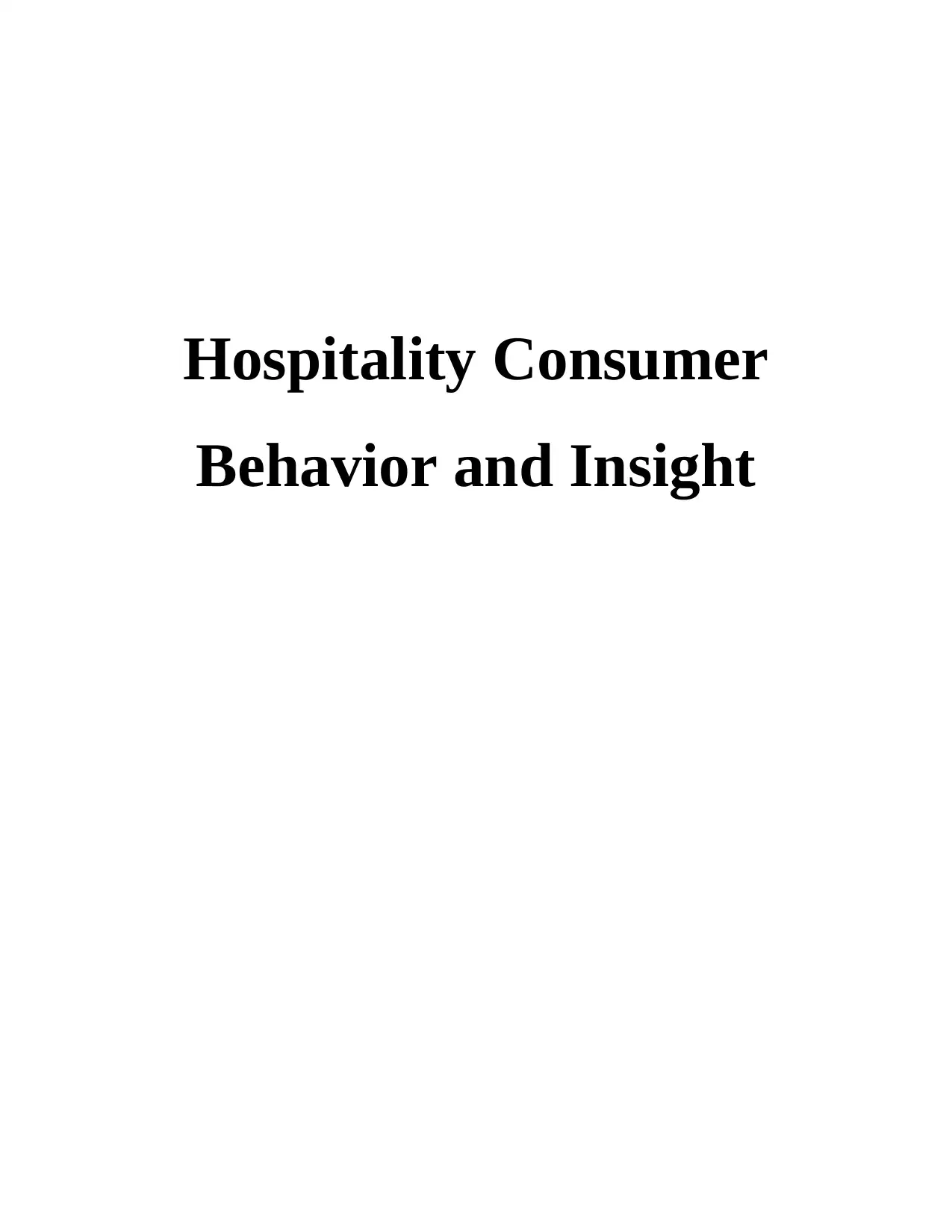
Hospitality Consumer
Behavior and Insight
Behavior and Insight
Paraphrase This Document
Need a fresh take? Get an instant paraphrase of this document with our AI Paraphraser
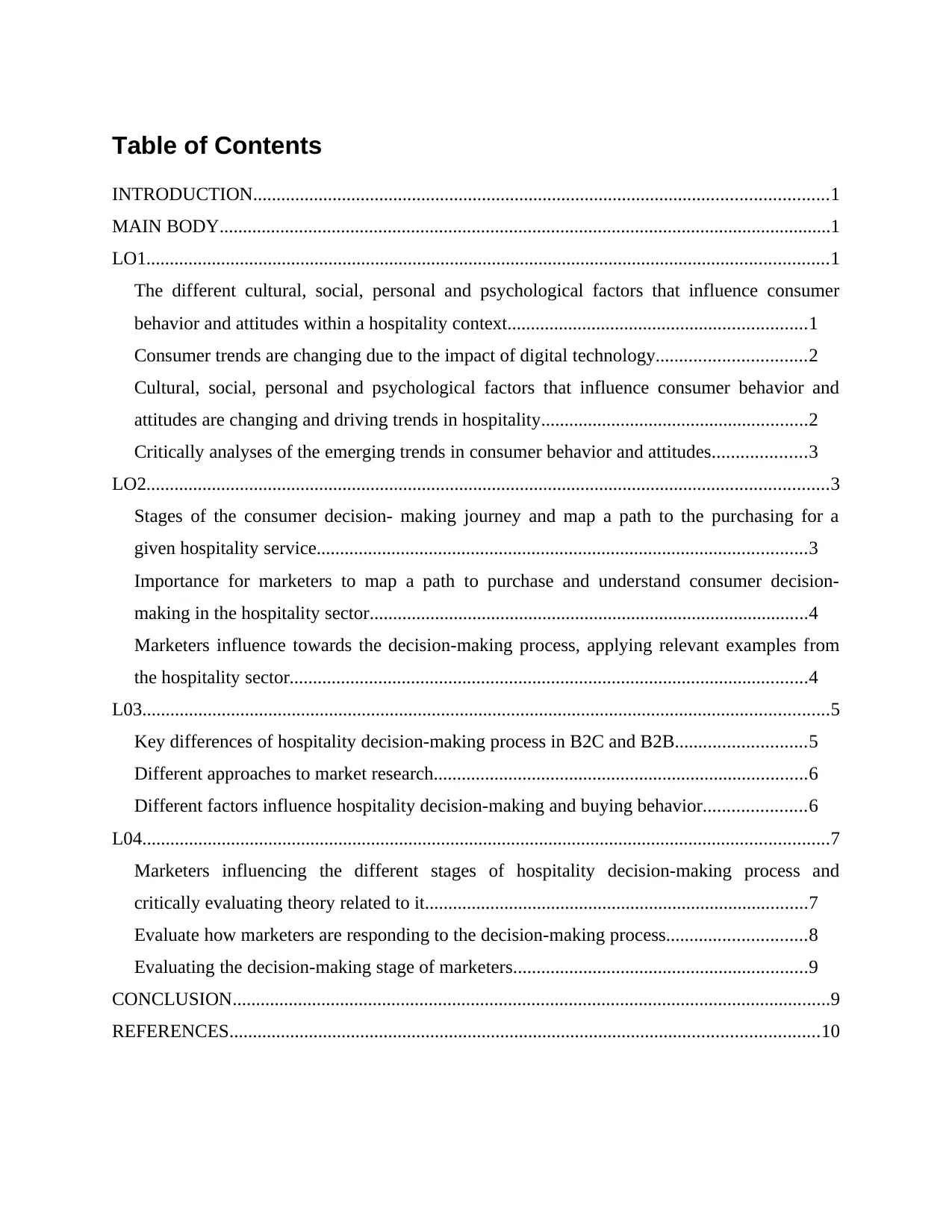
Table of Contents
INTRODUCTION...........................................................................................................................1
MAIN BODY...................................................................................................................................1
LO1..................................................................................................................................................1
The different cultural, social, personal and psychological factors that influence consumer
behavior and attitudes within a hospitality context................................................................1
Consumer trends are changing due to the impact of digital technology................................2
Cultural, social, personal and psychological factors that influence consumer behavior and
attitudes are changing and driving trends in hospitality.........................................................2
Critically analyses of the emerging trends in consumer behavior and attitudes....................3
LO2..................................................................................................................................................3
Stages of the consumer decision- making journey and map a path to the purchasing for a
given hospitality service.........................................................................................................3
Importance for marketers to map a path to purchase and understand consumer decision-
making in the hospitality sector..............................................................................................4
Marketers influence towards the decision-making process, applying relevant examples from
the hospitality sector...............................................................................................................4
L03...................................................................................................................................................5
Key differences of hospitality decision-making process in B2C and B2B............................5
Different approaches to market research................................................................................6
Different factors influence hospitality decision-making and buying behavior......................6
L04...................................................................................................................................................7
Marketers influencing the different stages of hospitality decision-making process and
critically evaluating theory related to it..................................................................................7
Evaluate how marketers are responding to the decision-making process..............................8
Evaluating the decision-making stage of marketers...............................................................9
CONCLUSION................................................................................................................................9
REFERENCES..............................................................................................................................10
INTRODUCTION...........................................................................................................................1
MAIN BODY...................................................................................................................................1
LO1..................................................................................................................................................1
The different cultural, social, personal and psychological factors that influence consumer
behavior and attitudes within a hospitality context................................................................1
Consumer trends are changing due to the impact of digital technology................................2
Cultural, social, personal and psychological factors that influence consumer behavior and
attitudes are changing and driving trends in hospitality.........................................................2
Critically analyses of the emerging trends in consumer behavior and attitudes....................3
LO2..................................................................................................................................................3
Stages of the consumer decision- making journey and map a path to the purchasing for a
given hospitality service.........................................................................................................3
Importance for marketers to map a path to purchase and understand consumer decision-
making in the hospitality sector..............................................................................................4
Marketers influence towards the decision-making process, applying relevant examples from
the hospitality sector...............................................................................................................4
L03...................................................................................................................................................5
Key differences of hospitality decision-making process in B2C and B2B............................5
Different approaches to market research................................................................................6
Different factors influence hospitality decision-making and buying behavior......................6
L04...................................................................................................................................................7
Marketers influencing the different stages of hospitality decision-making process and
critically evaluating theory related to it..................................................................................7
Evaluate how marketers are responding to the decision-making process..............................8
Evaluating the decision-making stage of marketers...............................................................9
CONCLUSION................................................................................................................................9
REFERENCES..............................................................................................................................10
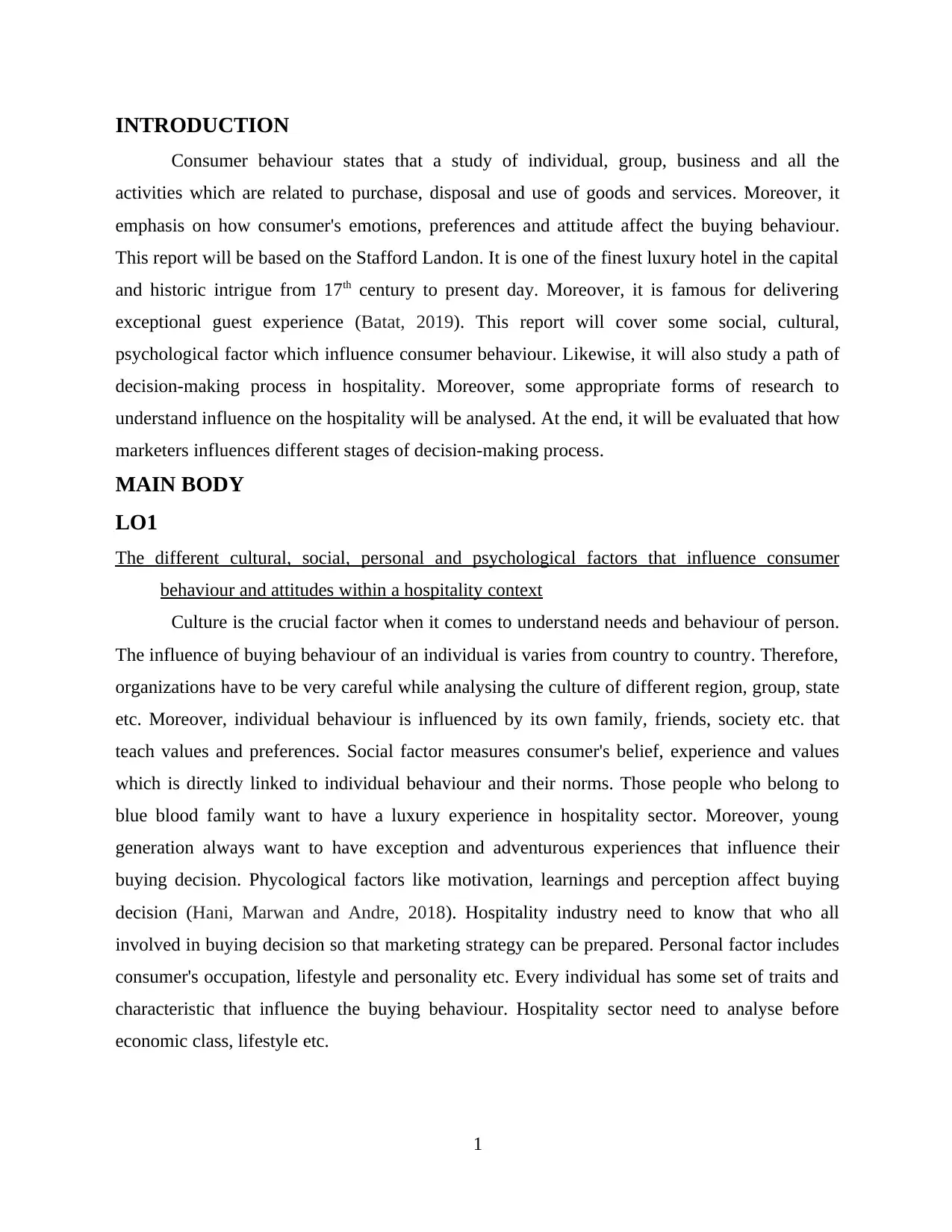
INTRODUCTION
Consumer behaviour states that a study of individual, group, business and all the
activities which are related to purchase, disposal and use of goods and services. Moreover, it
emphasis on how consumer's emotions, preferences and attitude affect the buying behaviour.
This report will be based on the Stafford Landon. It is one of the finest luxury hotel in the capital
and historic intrigue from 17th century to present day. Moreover, it is famous for delivering
exceptional guest experience (Batat, 2019). This report will cover some social, cultural,
psychological factor which influence consumer behaviour. Likewise, it will also study a path of
decision-making process in hospitality. Moreover, some appropriate forms of research to
understand influence on the hospitality will be analysed. At the end, it will be evaluated that how
marketers influences different stages of decision-making process.
MAIN BODY
LO1
The different cultural, social, personal and psychological factors that influence consumer
behaviour and attitudes within a hospitality context
Culture is the crucial factor when it comes to understand needs and behaviour of person.
The influence of buying behaviour of an individual is varies from country to country. Therefore,
organizations have to be very careful while analysing the culture of different region, group, state
etc. Moreover, individual behaviour is influenced by its own family, friends, society etc. that
teach values and preferences. Social factor measures consumer's belief, experience and values
which is directly linked to individual behaviour and their norms. Those people who belong to
blue blood family want to have a luxury experience in hospitality sector. Moreover, young
generation always want to have exception and adventurous experiences that influence their
buying decision. Phycological factors like motivation, learnings and perception affect buying
decision (Hani, Marwan and Andre, 2018). Hospitality industry need to know that who all
involved in buying decision so that marketing strategy can be prepared. Personal factor includes
consumer's occupation, lifestyle and personality etc. Every individual has some set of traits and
characteristic that influence the buying behaviour. Hospitality sector need to analyse before
economic class, lifestyle etc.
1
Consumer behaviour states that a study of individual, group, business and all the
activities which are related to purchase, disposal and use of goods and services. Moreover, it
emphasis on how consumer's emotions, preferences and attitude affect the buying behaviour.
This report will be based on the Stafford Landon. It is one of the finest luxury hotel in the capital
and historic intrigue from 17th century to present day. Moreover, it is famous for delivering
exceptional guest experience (Batat, 2019). This report will cover some social, cultural,
psychological factor which influence consumer behaviour. Likewise, it will also study a path of
decision-making process in hospitality. Moreover, some appropriate forms of research to
understand influence on the hospitality will be analysed. At the end, it will be evaluated that how
marketers influences different stages of decision-making process.
MAIN BODY
LO1
The different cultural, social, personal and psychological factors that influence consumer
behaviour and attitudes within a hospitality context
Culture is the crucial factor when it comes to understand needs and behaviour of person.
The influence of buying behaviour of an individual is varies from country to country. Therefore,
organizations have to be very careful while analysing the culture of different region, group, state
etc. Moreover, individual behaviour is influenced by its own family, friends, society etc. that
teach values and preferences. Social factor measures consumer's belief, experience and values
which is directly linked to individual behaviour and their norms. Those people who belong to
blue blood family want to have a luxury experience in hospitality sector. Moreover, young
generation always want to have exception and adventurous experiences that influence their
buying decision. Phycological factors like motivation, learnings and perception affect buying
decision (Hani, Marwan and Andre, 2018). Hospitality industry need to know that who all
involved in buying decision so that marketing strategy can be prepared. Personal factor includes
consumer's occupation, lifestyle and personality etc. Every individual has some set of traits and
characteristic that influence the buying behaviour. Hospitality sector need to analyse before
economic class, lifestyle etc.
1
⊘ This is a preview!⊘
Do you want full access?
Subscribe today to unlock all pages.

Trusted by 1+ million students worldwide
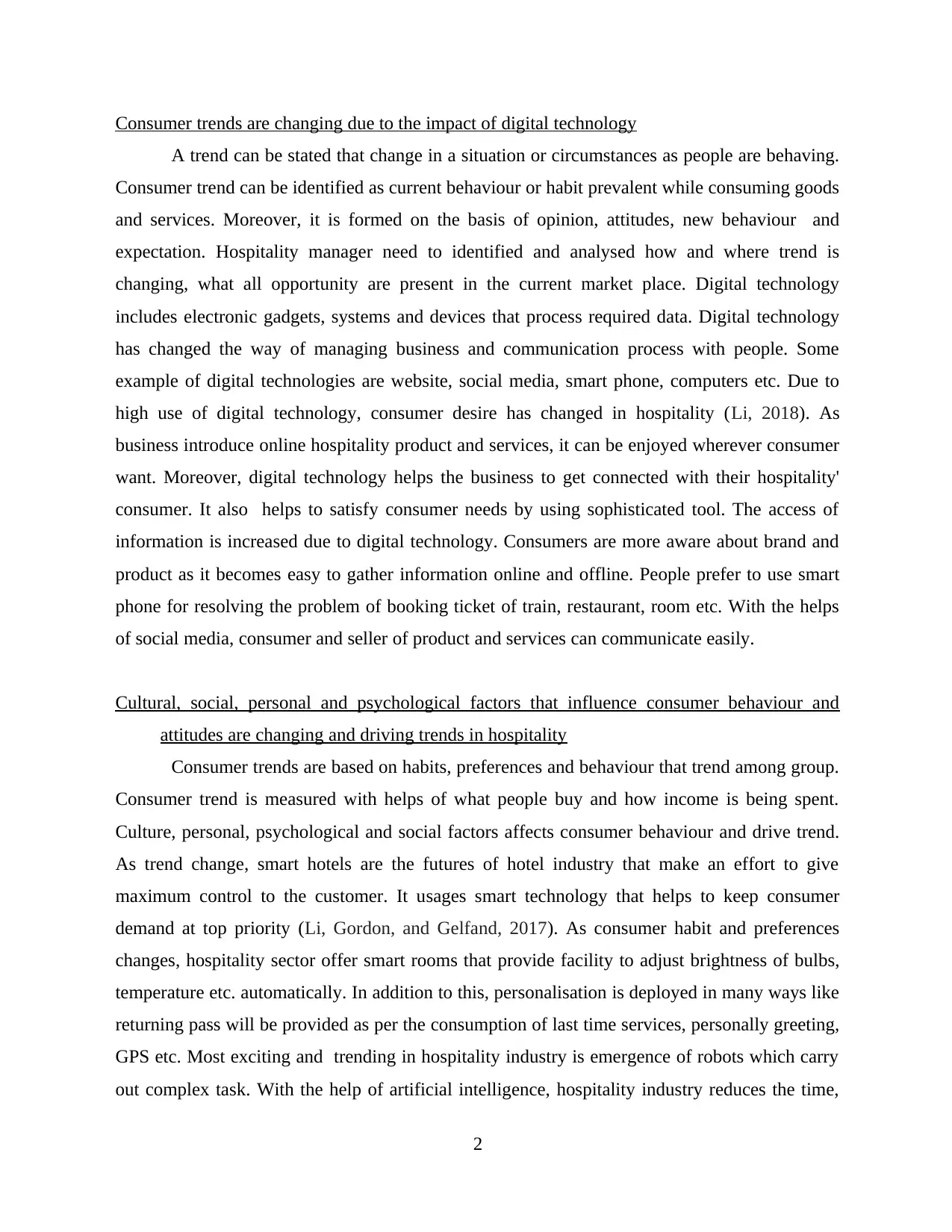
Consumer trends are changing due to the impact of digital technology
A trend can be stated that change in a situation or circumstances as people are behaving.
Consumer trend can be identified as current behaviour or habit prevalent while consuming goods
and services. Moreover, it is formed on the basis of opinion, attitudes, new behaviour and
expectation. Hospitality manager need to identified and analysed how and where trend is
changing, what all opportunity are present in the current market place. Digital technology
includes electronic gadgets, systems and devices that process required data. Digital technology
has changed the way of managing business and communication process with people. Some
example of digital technologies are website, social media, smart phone, computers etc. Due to
high use of digital technology, consumer desire has changed in hospitality (Li, 2018). As
business introduce online hospitality product and services, it can be enjoyed wherever consumer
want. Moreover, digital technology helps the business to get connected with their hospitality'
consumer. It also helps to satisfy consumer needs by using sophisticated tool. The access of
information is increased due to digital technology. Consumers are more aware about brand and
product as it becomes easy to gather information online and offline. People prefer to use smart
phone for resolving the problem of booking ticket of train, restaurant, room etc. With the helps
of social media, consumer and seller of product and services can communicate easily.
Cultural, social, personal and psychological factors that influence consumer behaviour and
attitudes are changing and driving trends in hospitality
Consumer trends are based on habits, preferences and behaviour that trend among group.
Consumer trend is measured with helps of what people buy and how income is being spent.
Culture, personal, psychological and social factors affects consumer behaviour and drive trend.
As trend change, smart hotels are the futures of hotel industry that make an effort to give
maximum control to the customer. It usages smart technology that helps to keep consumer
demand at top priority (Li, Gordon, and Gelfand, 2017). As consumer habit and preferences
changes, hospitality sector offer smart rooms that provide facility to adjust brightness of bulbs,
temperature etc. automatically. In addition to this, personalisation is deployed in many ways like
returning pass will be provided as per the consumption of last time services, personally greeting,
GPS etc. Most exciting and trending in hospitality industry is emergence of robots which carry
out complex task. With the help of artificial intelligence, hospitality industry reduces the time,
2
A trend can be stated that change in a situation or circumstances as people are behaving.
Consumer trend can be identified as current behaviour or habit prevalent while consuming goods
and services. Moreover, it is formed on the basis of opinion, attitudes, new behaviour and
expectation. Hospitality manager need to identified and analysed how and where trend is
changing, what all opportunity are present in the current market place. Digital technology
includes electronic gadgets, systems and devices that process required data. Digital technology
has changed the way of managing business and communication process with people. Some
example of digital technologies are website, social media, smart phone, computers etc. Due to
high use of digital technology, consumer desire has changed in hospitality (Li, 2018). As
business introduce online hospitality product and services, it can be enjoyed wherever consumer
want. Moreover, digital technology helps the business to get connected with their hospitality'
consumer. It also helps to satisfy consumer needs by using sophisticated tool. The access of
information is increased due to digital technology. Consumers are more aware about brand and
product as it becomes easy to gather information online and offline. People prefer to use smart
phone for resolving the problem of booking ticket of train, restaurant, room etc. With the helps
of social media, consumer and seller of product and services can communicate easily.
Cultural, social, personal and psychological factors that influence consumer behaviour and
attitudes are changing and driving trends in hospitality
Consumer trends are based on habits, preferences and behaviour that trend among group.
Consumer trend is measured with helps of what people buy and how income is being spent.
Culture, personal, psychological and social factors affects consumer behaviour and drive trend.
As trend change, smart hotels are the futures of hotel industry that make an effort to give
maximum control to the customer. It usages smart technology that helps to keep consumer
demand at top priority (Li, Gordon, and Gelfand, 2017). As consumer habit and preferences
changes, hospitality sector offer smart rooms that provide facility to adjust brightness of bulbs,
temperature etc. automatically. In addition to this, personalisation is deployed in many ways like
returning pass will be provided as per the consumption of last time services, personally greeting,
GPS etc. Most exciting and trending in hospitality industry is emergence of robots which carry
out complex task. With the help of artificial intelligence, hospitality industry reduces the time,
2
Paraphrase This Document
Need a fresh take? Get an instant paraphrase of this document with our AI Paraphraser
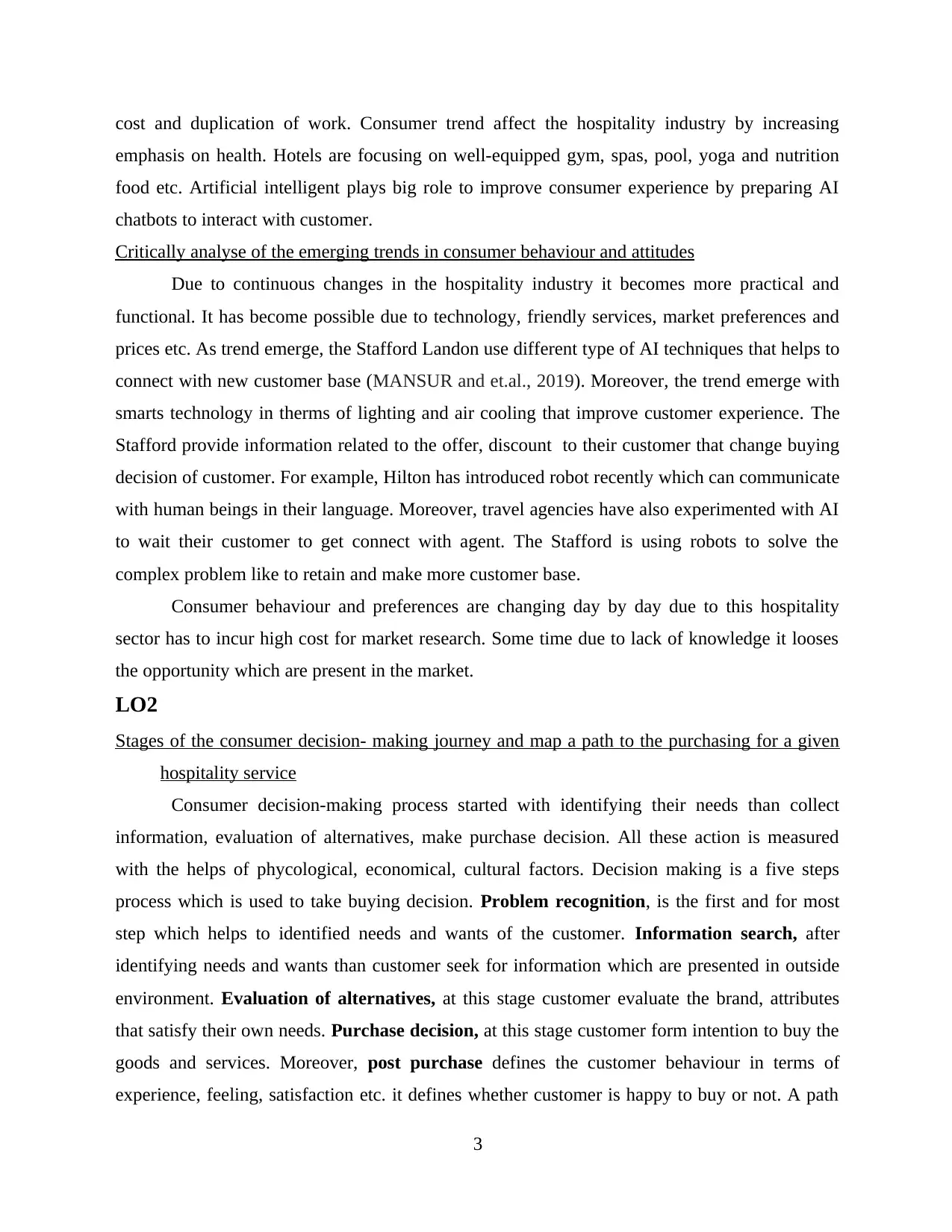
cost and duplication of work. Consumer trend affect the hospitality industry by increasing
emphasis on health. Hotels are focusing on well-equipped gym, spas, pool, yoga and nutrition
food etc. Artificial intelligent plays big role to improve consumer experience by preparing AI
chatbots to interact with customer.
Critically analyse of the emerging trends in consumer behaviour and attitudes
Due to continuous changes in the hospitality industry it becomes more practical and
functional. It has become possible due to technology, friendly services, market preferences and
prices etc. As trend emerge, the Stafford Landon use different type of AI techniques that helps to
connect with new customer base (MANSUR and et.al., 2019). Moreover, the trend emerge with
smarts technology in therms of lighting and air cooling that improve customer experience. The
Stafford provide information related to the offer, discount to their customer that change buying
decision of customer. For example, Hilton has introduced robot recently which can communicate
with human beings in their language. Moreover, travel agencies have also experimented with AI
to wait their customer to get connect with agent. The Stafford is using robots to solve the
complex problem like to retain and make more customer base.
Consumer behaviour and preferences are changing day by day due to this hospitality
sector has to incur high cost for market research. Some time due to lack of knowledge it looses
the opportunity which are present in the market.
LO2
Stages of the consumer decision- making journey and map a path to the purchasing for a given
hospitality service
Consumer decision-making process started with identifying their needs than collect
information, evaluation of alternatives, make purchase decision. All these action is measured
with the helps of phycological, economical, cultural factors. Decision making is a five steps
process which is used to take buying decision. Problem recognition, is the first and for most
step which helps to identified needs and wants of the customer. Information search, after
identifying needs and wants than customer seek for information which are presented in outside
environment. Evaluation of alternatives, at this stage customer evaluate the brand, attributes
that satisfy their own needs. Purchase decision, at this stage customer form intention to buy the
goods and services. Moreover, post purchase defines the customer behaviour in terms of
experience, feeling, satisfaction etc. it defines whether customer is happy to buy or not. A path
3
emphasis on health. Hotels are focusing on well-equipped gym, spas, pool, yoga and nutrition
food etc. Artificial intelligent plays big role to improve consumer experience by preparing AI
chatbots to interact with customer.
Critically analyse of the emerging trends in consumer behaviour and attitudes
Due to continuous changes in the hospitality industry it becomes more practical and
functional. It has become possible due to technology, friendly services, market preferences and
prices etc. As trend emerge, the Stafford Landon use different type of AI techniques that helps to
connect with new customer base (MANSUR and et.al., 2019). Moreover, the trend emerge with
smarts technology in therms of lighting and air cooling that improve customer experience. The
Stafford provide information related to the offer, discount to their customer that change buying
decision of customer. For example, Hilton has introduced robot recently which can communicate
with human beings in their language. Moreover, travel agencies have also experimented with AI
to wait their customer to get connect with agent. The Stafford is using robots to solve the
complex problem like to retain and make more customer base.
Consumer behaviour and preferences are changing day by day due to this hospitality
sector has to incur high cost for market research. Some time due to lack of knowledge it looses
the opportunity which are present in the market.
LO2
Stages of the consumer decision- making journey and map a path to the purchasing for a given
hospitality service
Consumer decision-making process started with identifying their needs than collect
information, evaluation of alternatives, make purchase decision. All these action is measured
with the helps of phycological, economical, cultural factors. Decision making is a five steps
process which is used to take buying decision. Problem recognition, is the first and for most
step which helps to identified needs and wants of the customer. Information search, after
identifying needs and wants than customer seek for information which are presented in outside
environment. Evaluation of alternatives, at this stage customer evaluate the brand, attributes
that satisfy their own needs. Purchase decision, at this stage customer form intention to buy the
goods and services. Moreover, post purchase defines the customer behaviour in terms of
experience, feeling, satisfaction etc. it defines whether customer is happy to buy or not. A path
3
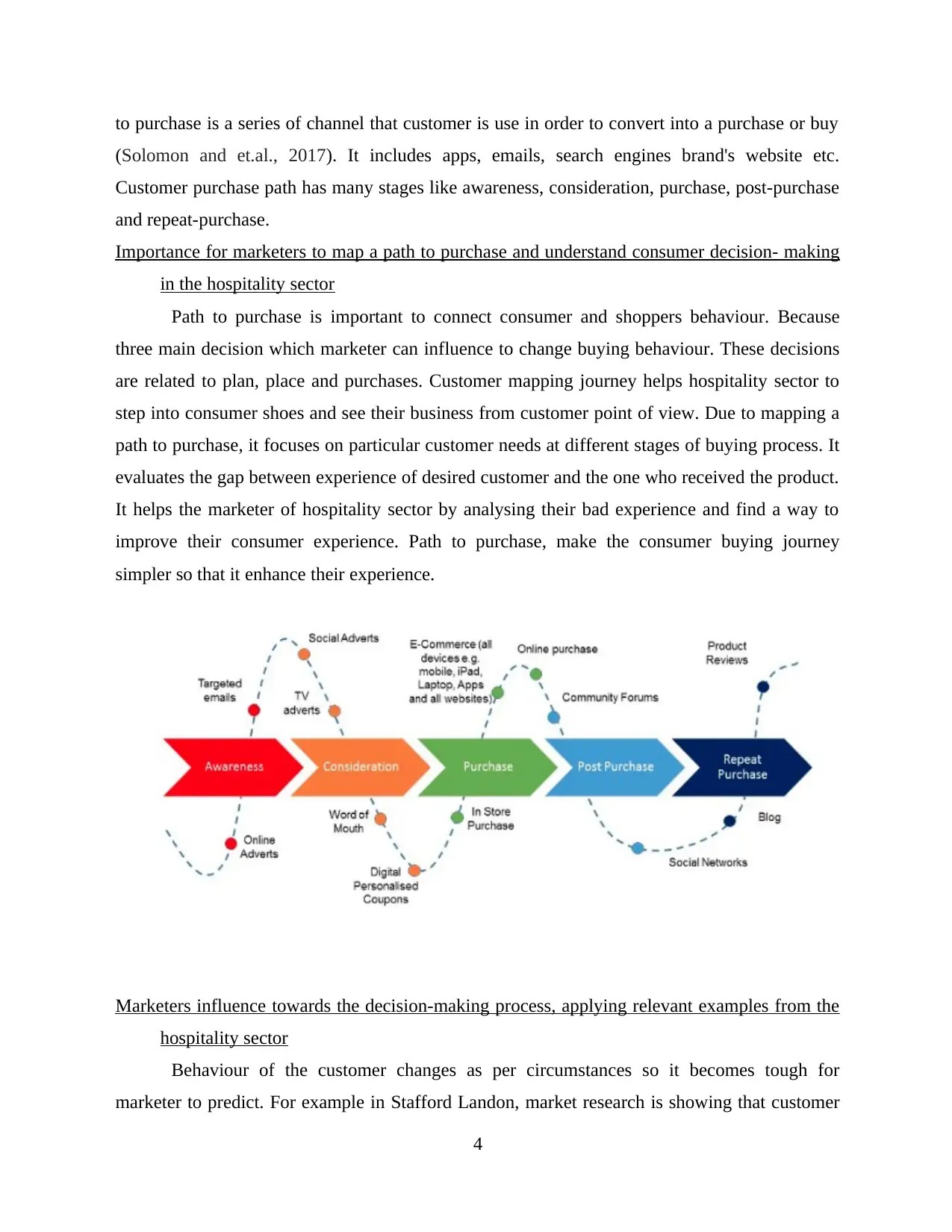
to purchase is a series of channel that customer is use in order to convert into a purchase or buy
(Solomon and et.al., 2017). It includes apps, emails, search engines brand's website etc.
Customer purchase path has many stages like awareness, consideration, purchase, post-purchase
and repeat-purchase.
Importance for marketers to map a path to purchase and understand consumer decision- making
in the hospitality sector
Path to purchase is important to connect consumer and shoppers behaviour. Because
three main decision which marketer can influence to change buying behaviour. These decisions
are related to plan, place and purchases. Customer mapping journey helps hospitality sector to
step into consumer shoes and see their business from customer point of view. Due to mapping a
path to purchase, it focuses on particular customer needs at different stages of buying process. It
evaluates the gap between experience of desired customer and the one who received the product.
It helps the marketer of hospitality sector by analysing their bad experience and find a way to
improve their consumer experience. Path to purchase, make the consumer buying journey
simpler so that it enhance their experience.
Marketers influence towards the decision-making process, applying relevant examples from the
hospitality sector
Behaviour of the customer changes as per circumstances so it becomes tough for
marketer to predict. For example in Stafford Landon, market research is showing that customer
4
(Solomon and et.al., 2017). It includes apps, emails, search engines brand's website etc.
Customer purchase path has many stages like awareness, consideration, purchase, post-purchase
and repeat-purchase.
Importance for marketers to map a path to purchase and understand consumer decision- making
in the hospitality sector
Path to purchase is important to connect consumer and shoppers behaviour. Because
three main decision which marketer can influence to change buying behaviour. These decisions
are related to plan, place and purchases. Customer mapping journey helps hospitality sector to
step into consumer shoes and see their business from customer point of view. Due to mapping a
path to purchase, it focuses on particular customer needs at different stages of buying process. It
evaluates the gap between experience of desired customer and the one who received the product.
It helps the marketer of hospitality sector by analysing their bad experience and find a way to
improve their consumer experience. Path to purchase, make the consumer buying journey
simpler so that it enhance their experience.
Marketers influence towards the decision-making process, applying relevant examples from the
hospitality sector
Behaviour of the customer changes as per circumstances so it becomes tough for
marketer to predict. For example in Stafford Landon, market research is showing that customer
4
⊘ This is a preview!⊘
Do you want full access?
Subscribe today to unlock all pages.

Trusted by 1+ million students worldwide
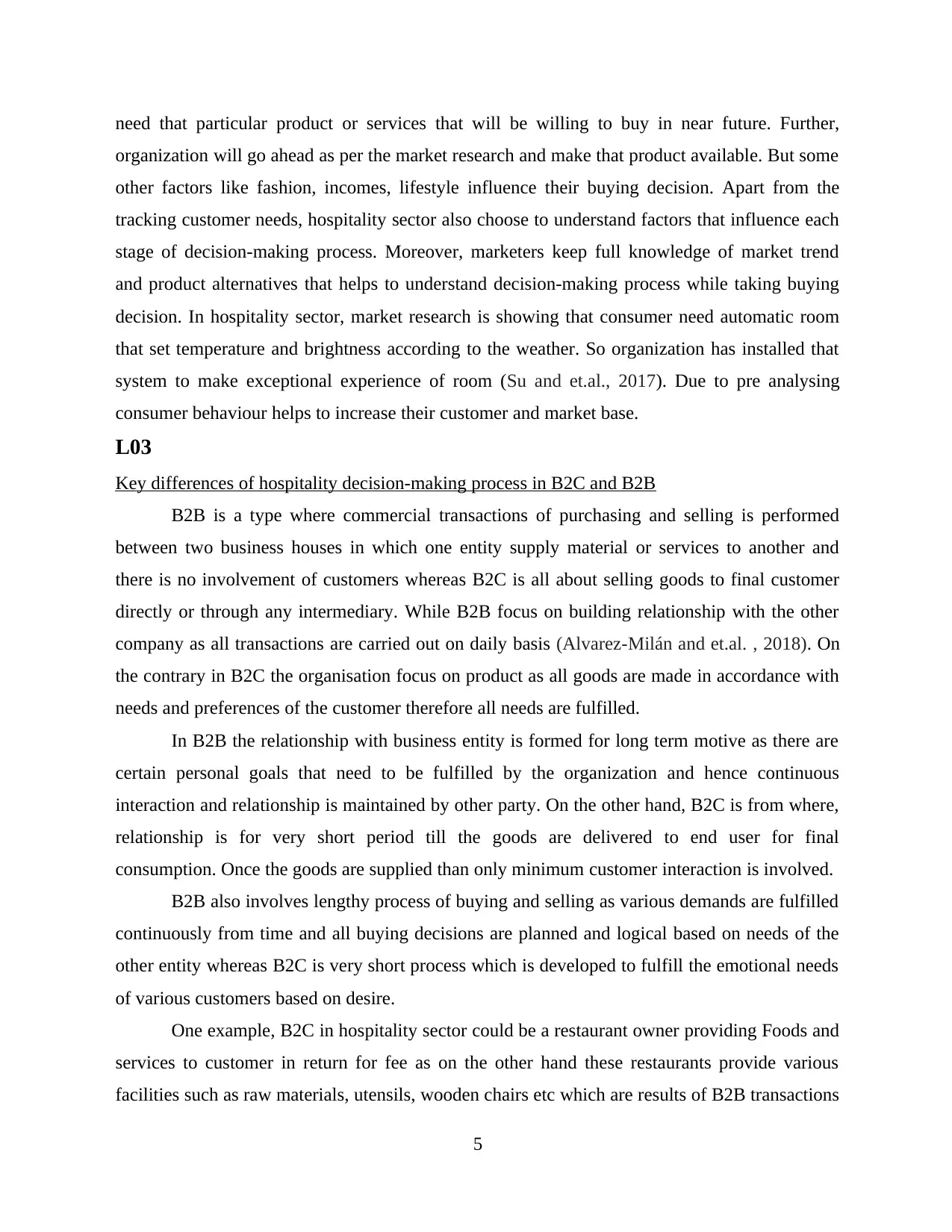
need that particular product or services that will be willing to buy in near future. Further,
organization will go ahead as per the market research and make that product available. But some
other factors like fashion, incomes, lifestyle influence their buying decision. Apart from the
tracking customer needs, hospitality sector also choose to understand factors that influence each
stage of decision-making process. Moreover, marketers keep full knowledge of market trend
and product alternatives that helps to understand decision-making process while taking buying
decision. In hospitality sector, market research is showing that consumer need automatic room
that set temperature and brightness according to the weather. So organization has installed that
system to make exceptional experience of room (Su and et.al., 2017). Due to pre analysing
consumer behaviour helps to increase their customer and market base.
L03
Key differences of hospitality decision-making process in B2C and B2B
B2B is a type where commercial transactions of purchasing and selling is performed
between two business houses in which one entity supply material or services to another and
there is no involvement of customers whereas B2C is all about selling goods to final customer
directly or through any intermediary. While B2B focus on building relationship with the other
company as all transactions are carried out on daily basis (Alvarez-Milán and et.al. , 2018). On
the contrary in B2C the organisation focus on product as all goods are made in accordance with
needs and preferences of the customer therefore all needs are fulfilled.
In B2B the relationship with business entity is formed for long term motive as there are
certain personal goals that need to be fulfilled by the organization and hence continuous
interaction and relationship is maintained by other party. On the other hand, B2C is from where,
relationship is for very short period till the goods are delivered to end user for final
consumption. Once the goods are supplied than only minimum customer interaction is involved.
B2B also involves lengthy process of buying and selling as various demands are fulfilled
continuously from time and all buying decisions are planned and logical based on needs of the
other entity whereas B2C is very short process which is developed to fulfill the emotional needs
of various customers based on desire.
One example, B2C in hospitality sector could be a restaurant owner providing Foods and
services to customer in return for fee as on the other hand these restaurants provide various
facilities such as raw materials, utensils, wooden chairs etc which are results of B2B transactions
5
organization will go ahead as per the market research and make that product available. But some
other factors like fashion, incomes, lifestyle influence their buying decision. Apart from the
tracking customer needs, hospitality sector also choose to understand factors that influence each
stage of decision-making process. Moreover, marketers keep full knowledge of market trend
and product alternatives that helps to understand decision-making process while taking buying
decision. In hospitality sector, market research is showing that consumer need automatic room
that set temperature and brightness according to the weather. So organization has installed that
system to make exceptional experience of room (Su and et.al., 2017). Due to pre analysing
consumer behaviour helps to increase their customer and market base.
L03
Key differences of hospitality decision-making process in B2C and B2B
B2B is a type where commercial transactions of purchasing and selling is performed
between two business houses in which one entity supply material or services to another and
there is no involvement of customers whereas B2C is all about selling goods to final customer
directly or through any intermediary. While B2B focus on building relationship with the other
company as all transactions are carried out on daily basis (Alvarez-Milán and et.al. , 2018). On
the contrary in B2C the organisation focus on product as all goods are made in accordance with
needs and preferences of the customer therefore all needs are fulfilled.
In B2B the relationship with business entity is formed for long term motive as there are
certain personal goals that need to be fulfilled by the organization and hence continuous
interaction and relationship is maintained by other party. On the other hand, B2C is from where,
relationship is for very short period till the goods are delivered to end user for final
consumption. Once the goods are supplied than only minimum customer interaction is involved.
B2B also involves lengthy process of buying and selling as various demands are fulfilled
continuously from time and all buying decisions are planned and logical based on needs of the
other entity whereas B2C is very short process which is developed to fulfill the emotional needs
of various customers based on desire.
One example, B2C in hospitality sector could be a restaurant owner providing Foods and
services to customer in return for fee as on the other hand these restaurants provide various
facilities such as raw materials, utensils, wooden chairs etc which are results of B2B transactions
5
Paraphrase This Document
Need a fresh take? Get an instant paraphrase of this document with our AI Paraphraser
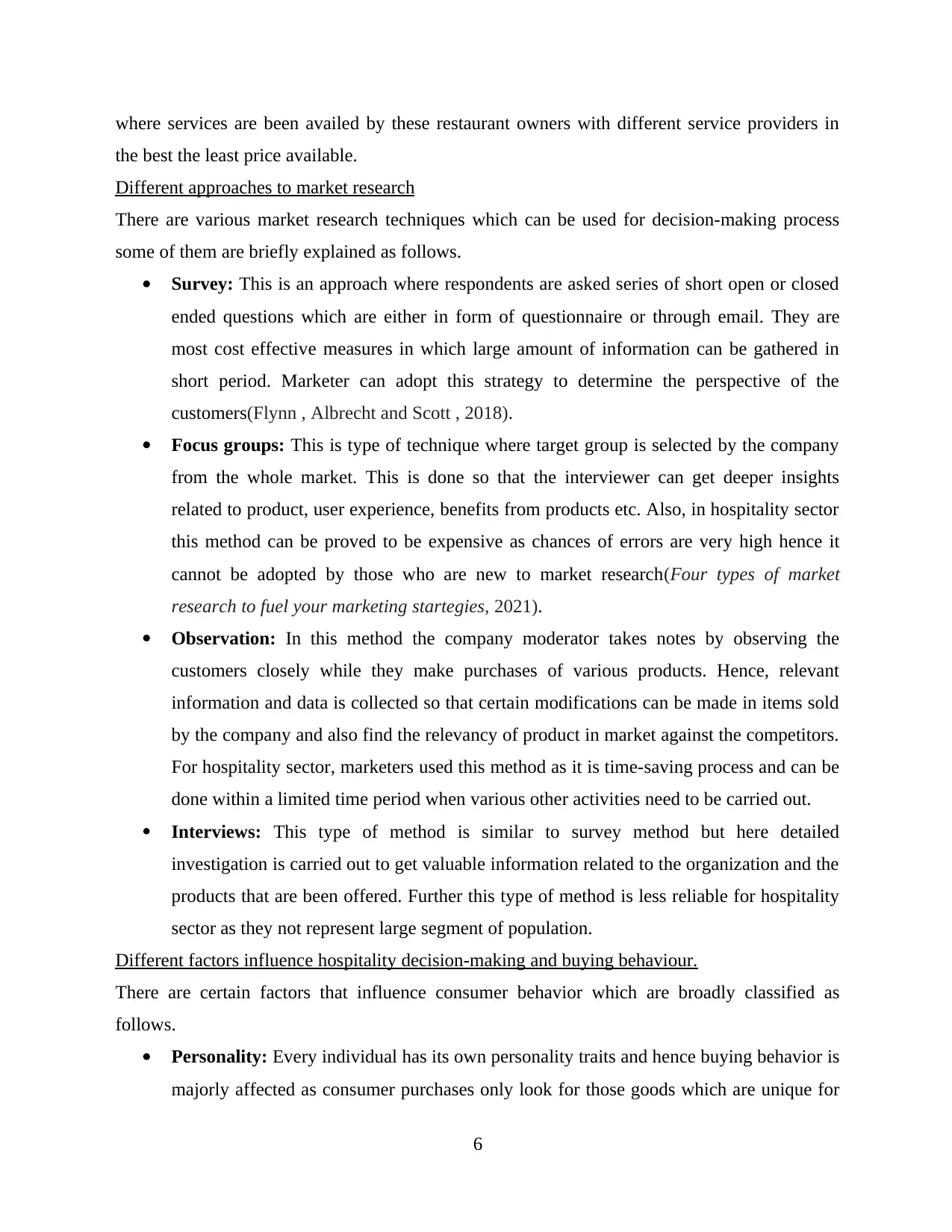
where services are been availed by these restaurant owners with different service providers in
the best the least price available.
Different approaches to market research
There are various market research techniques which can be used for decision-making process
some of them are briefly explained as follows.
Survey: This is an approach where respondents are asked series of short open or closed
ended questions which are either in form of questionnaire or through email. They are
most cost effective measures in which large amount of information can be gathered in
short period. Marketer can adopt this strategy to determine the perspective of the
customers(Flynn , Albrecht and Scott , 2018).
Focus groups: This is type of technique where target group is selected by the company
from the whole market. This is done so that the interviewer can get deeper insights
related to product, user experience, benefits from products etc. Also, in hospitality sector
this method can be proved to be expensive as chances of errors are very high hence it
cannot be adopted by those who are new to market research(Four types of market
research to fuel your marketing startegies, 2021).
Observation: In this method the company moderator takes notes by observing the
customers closely while they make purchases of various products. Hence, relevant
information and data is collected so that certain modifications can be made in items sold
by the company and also find the relevancy of product in market against the competitors.
For hospitality sector, marketers used this method as it is time-saving process and can be
done within a limited time period when various other activities need to be carried out.
Interviews: This type of method is similar to survey method but here detailed
investigation is carried out to get valuable information related to the organization and the
products that are been offered. Further this type of method is less reliable for hospitality
sector as they not represent large segment of population.
Different factors influence hospitality decision-making and buying behaviour.
There are certain factors that influence consumer behavior which are broadly classified as
follows.
Personality: Every individual has its own personality traits and hence buying behavior is
majorly affected as consumer purchases only look for those goods which are unique for
6
the best the least price available.
Different approaches to market research
There are various market research techniques which can be used for decision-making process
some of them are briefly explained as follows.
Survey: This is an approach where respondents are asked series of short open or closed
ended questions which are either in form of questionnaire or through email. They are
most cost effective measures in which large amount of information can be gathered in
short period. Marketer can adopt this strategy to determine the perspective of the
customers(Flynn , Albrecht and Scott , 2018).
Focus groups: This is type of technique where target group is selected by the company
from the whole market. This is done so that the interviewer can get deeper insights
related to product, user experience, benefits from products etc. Also, in hospitality sector
this method can be proved to be expensive as chances of errors are very high hence it
cannot be adopted by those who are new to market research(Four types of market
research to fuel your marketing startegies, 2021).
Observation: In this method the company moderator takes notes by observing the
customers closely while they make purchases of various products. Hence, relevant
information and data is collected so that certain modifications can be made in items sold
by the company and also find the relevancy of product in market against the competitors.
For hospitality sector, marketers used this method as it is time-saving process and can be
done within a limited time period when various other activities need to be carried out.
Interviews: This type of method is similar to survey method but here detailed
investigation is carried out to get valuable information related to the organization and the
products that are been offered. Further this type of method is less reliable for hospitality
sector as they not represent large segment of population.
Different factors influence hospitality decision-making and buying behaviour.
There are certain factors that influence consumer behavior which are broadly classified as
follows.
Personality: Every individual has its own personality traits and hence buying behavior is
majorly affected as consumer purchases only look for those goods which are unique for
6
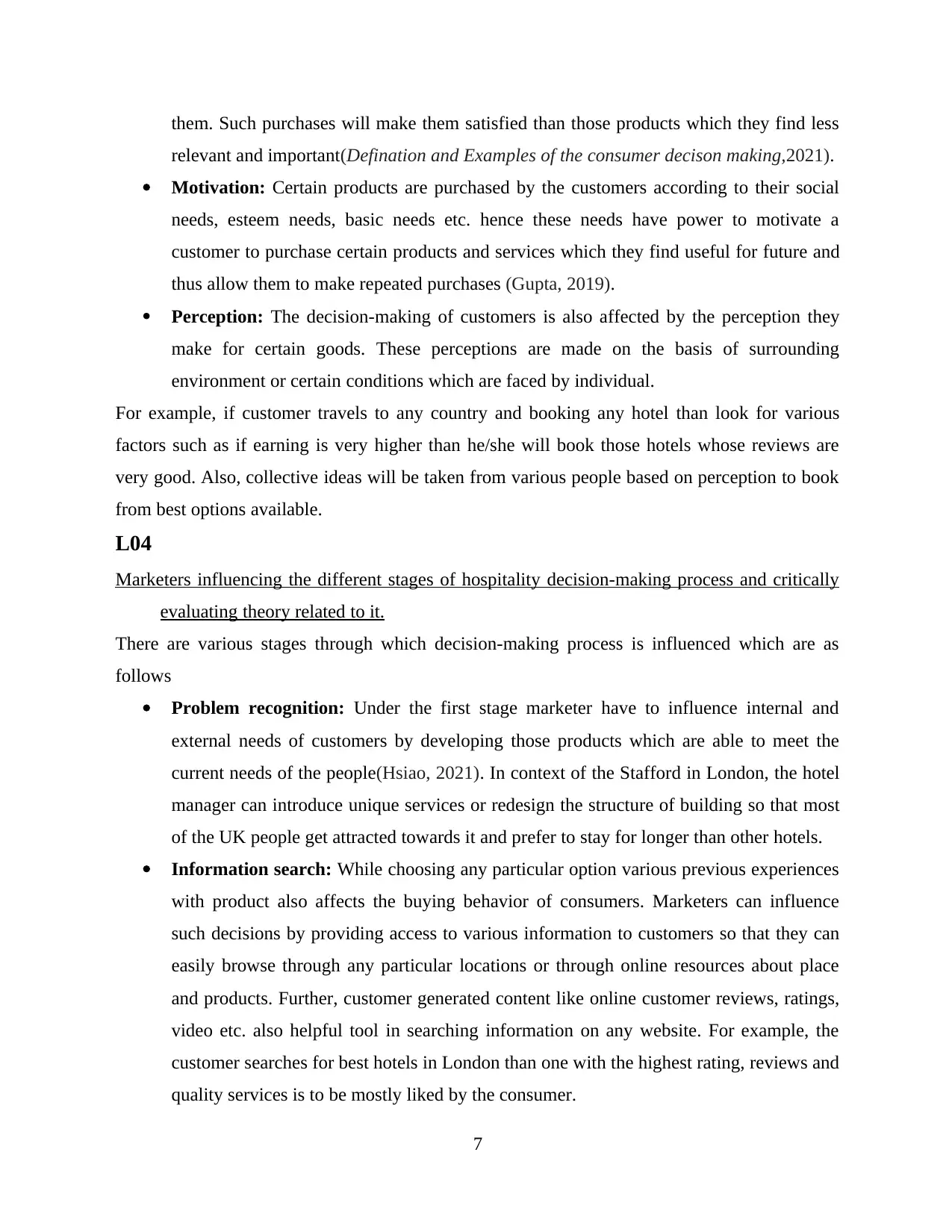
them. Such purchases will make them satisfied than those products which they find less
relevant and important(Defination and Examples of the consumer decison making,2021).
Motivation: Certain products are purchased by the customers according to their social
needs, esteem needs, basic needs etc. hence these needs have power to motivate a
customer to purchase certain products and services which they find useful for future and
thus allow them to make repeated purchases (Gupta, 2019).
Perception: The decision-making of customers is also affected by the perception they
make for certain goods. These perceptions are made on the basis of surrounding
environment or certain conditions which are faced by individual.
For example, if customer travels to any country and booking any hotel than look for various
factors such as if earning is very higher than he/she will book those hotels whose reviews are
very good. Also, collective ideas will be taken from various people based on perception to book
from best options available.
L04
Marketers influencing the different stages of hospitality decision-making process and critically
evaluating theory related to it.
There are various stages through which decision-making process is influenced which are as
follows
Problem recognition: Under the first stage marketer have to influence internal and
external needs of customers by developing those products which are able to meet the
current needs of the people(Hsiao, 2021). In context of the Stafford in London, the hotel
manager can introduce unique services or redesign the structure of building so that most
of the UK people get attracted towards it and prefer to stay for longer than other hotels.
Information search: While choosing any particular option various previous experiences
with product also affects the buying behavior of consumers. Marketers can influence
such decisions by providing access to various information to customers so that they can
easily browse through any particular locations or through online resources about place
and products. Further, customer generated content like online customer reviews, ratings,
video etc. also helpful tool in searching information on any website. For example, the
customer searches for best hotels in London than one with the highest rating, reviews and
quality services is to be mostly liked by the consumer.
7
relevant and important(Defination and Examples of the consumer decison making,2021).
Motivation: Certain products are purchased by the customers according to their social
needs, esteem needs, basic needs etc. hence these needs have power to motivate a
customer to purchase certain products and services which they find useful for future and
thus allow them to make repeated purchases (Gupta, 2019).
Perception: The decision-making of customers is also affected by the perception they
make for certain goods. These perceptions are made on the basis of surrounding
environment or certain conditions which are faced by individual.
For example, if customer travels to any country and booking any hotel than look for various
factors such as if earning is very higher than he/she will book those hotels whose reviews are
very good. Also, collective ideas will be taken from various people based on perception to book
from best options available.
L04
Marketers influencing the different stages of hospitality decision-making process and critically
evaluating theory related to it.
There are various stages through which decision-making process is influenced which are as
follows
Problem recognition: Under the first stage marketer have to influence internal and
external needs of customers by developing those products which are able to meet the
current needs of the people(Hsiao, 2021). In context of the Stafford in London, the hotel
manager can introduce unique services or redesign the structure of building so that most
of the UK people get attracted towards it and prefer to stay for longer than other hotels.
Information search: While choosing any particular option various previous experiences
with product also affects the buying behavior of consumers. Marketers can influence
such decisions by providing access to various information to customers so that they can
easily browse through any particular locations or through online resources about place
and products. Further, customer generated content like online customer reviews, ratings,
video etc. also helpful tool in searching information on any website. For example, the
customer searches for best hotels in London than one with the highest rating, reviews and
quality services is to be mostly liked by the consumer.
7
⊘ This is a preview!⊘
Do you want full access?
Subscribe today to unlock all pages.

Trusted by 1+ million students worldwide
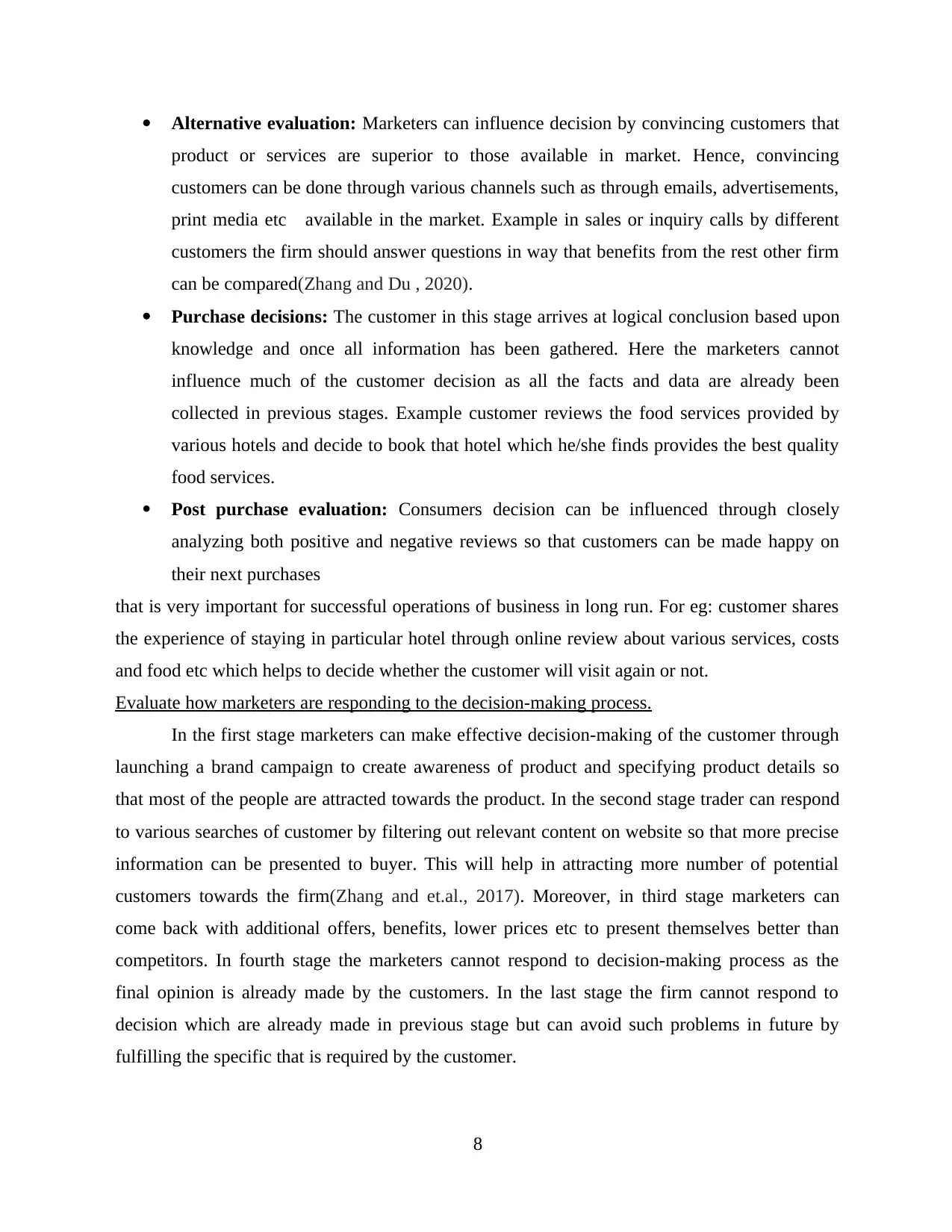
Alternative evaluation: Marketers can influence decision by convincing customers that
product or services are superior to those available in market. Hence, convincing
customers can be done through various channels such as through emails, advertisements,
print media etc available in the market. Example in sales or inquiry calls by different
customers the firm should answer questions in way that benefits from the rest other firm
can be compared(Zhang and Du , 2020).
Purchase decisions: The customer in this stage arrives at logical conclusion based upon
knowledge and once all information has been gathered. Here the marketers cannot
influence much of the customer decision as all the facts and data are already been
collected in previous stages. Example customer reviews the food services provided by
various hotels and decide to book that hotel which he/she finds provides the best quality
food services.
Post purchase evaluation: Consumers decision can be influenced through closely
analyzing both positive and negative reviews so that customers can be made happy on
their next purchases
that is very important for successful operations of business in long run. For eg: customer shares
the experience of staying in particular hotel through online review about various services, costs
and food etc which helps to decide whether the customer will visit again or not.
Evaluate how marketers are responding to the decision-making process.
In the first stage marketers can make effective decision-making of the customer through
launching a brand campaign to create awareness of product and specifying product details so
that most of the people are attracted towards the product. In the second stage trader can respond
to various searches of customer by filtering out relevant content on website so that more precise
information can be presented to buyer. This will help in attracting more number of potential
customers towards the firm(Zhang and et.al., 2017). Moreover, in third stage marketers can
come back with additional offers, benefits, lower prices etc to present themselves better than
competitors. In fourth stage the marketers cannot respond to decision-making process as the
final opinion is already made by the customers. In the last stage the firm cannot respond to
decision which are already made in previous stage but can avoid such problems in future by
fulfilling the specific that is required by the customer.
8
product or services are superior to those available in market. Hence, convincing
customers can be done through various channels such as through emails, advertisements,
print media etc available in the market. Example in sales or inquiry calls by different
customers the firm should answer questions in way that benefits from the rest other firm
can be compared(Zhang and Du , 2020).
Purchase decisions: The customer in this stage arrives at logical conclusion based upon
knowledge and once all information has been gathered. Here the marketers cannot
influence much of the customer decision as all the facts and data are already been
collected in previous stages. Example customer reviews the food services provided by
various hotels and decide to book that hotel which he/she finds provides the best quality
food services.
Post purchase evaluation: Consumers decision can be influenced through closely
analyzing both positive and negative reviews so that customers can be made happy on
their next purchases
that is very important for successful operations of business in long run. For eg: customer shares
the experience of staying in particular hotel through online review about various services, costs
and food etc which helps to decide whether the customer will visit again or not.
Evaluate how marketers are responding to the decision-making process.
In the first stage marketers can make effective decision-making of the customer through
launching a brand campaign to create awareness of product and specifying product details so
that most of the people are attracted towards the product. In the second stage trader can respond
to various searches of customer by filtering out relevant content on website so that more precise
information can be presented to buyer. This will help in attracting more number of potential
customers towards the firm(Zhang and et.al., 2017). Moreover, in third stage marketers can
come back with additional offers, benefits, lower prices etc to present themselves better than
competitors. In fourth stage the marketers cannot respond to decision-making process as the
final opinion is already made by the customers. In the last stage the firm cannot respond to
decision which are already made in previous stage but can avoid such problems in future by
fulfilling the specific that is required by the customer.
8
Paraphrase This Document
Need a fresh take? Get an instant paraphrase of this document with our AI Paraphraser
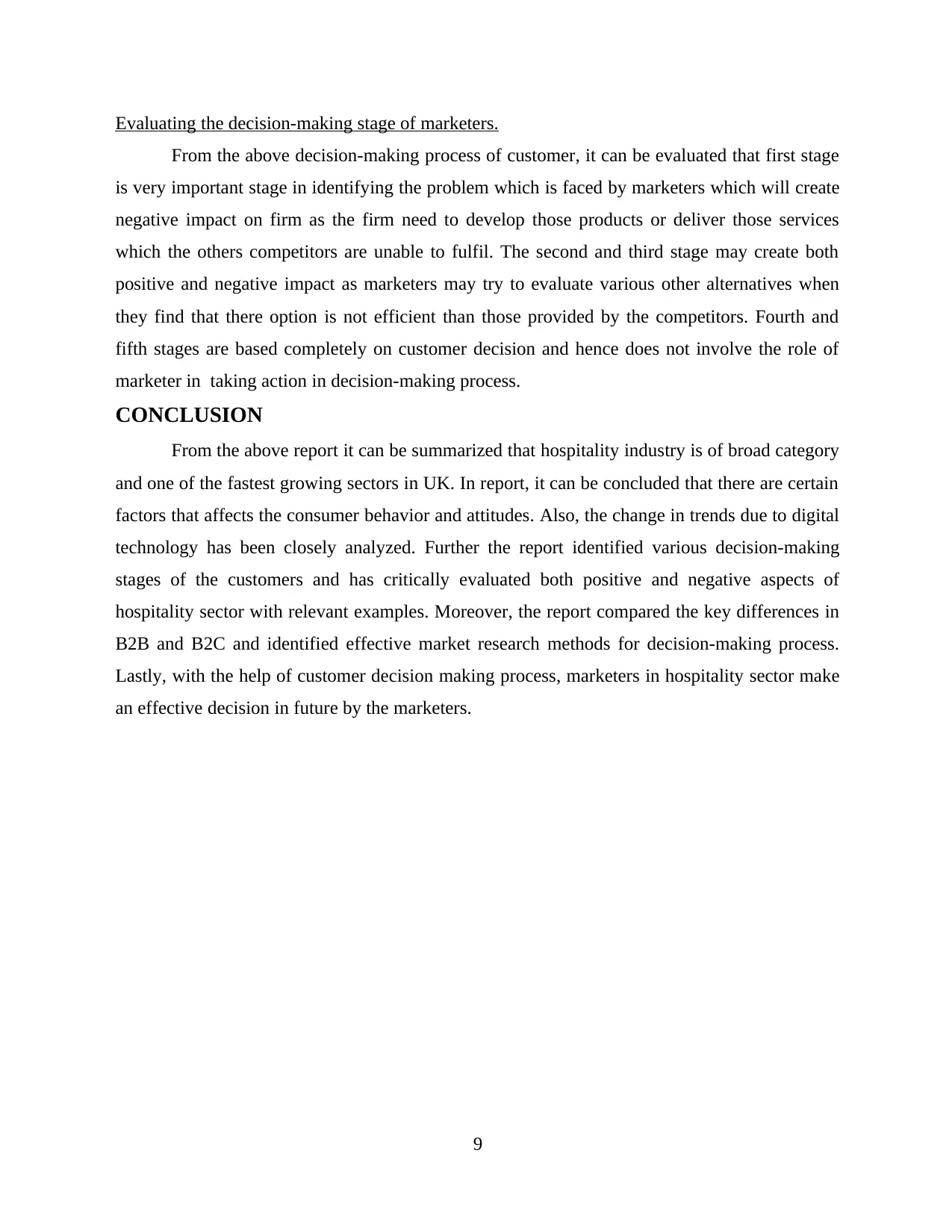
Evaluating the decision-making stage of marketers.
From the above decision-making process of customer, it can be evaluated that first stage
is very important stage in identifying the problem which is faced by marketers which will create
negative impact on firm as the firm need to develop those products or deliver those services
which the others competitors are unable to fulfil. The second and third stage may create both
positive and negative impact as marketers may try to evaluate various other alternatives when
they find that there option is not efficient than those provided by the competitors. Fourth and
fifth stages are based completely on customer decision and hence does not involve the role of
marketer in taking action in decision-making process.
CONCLUSION
From the above report it can be summarized that hospitality industry is of broad category
and one of the fastest growing sectors in UK. In report, it can be concluded that there are certain
factors that affects the consumer behavior and attitudes. Also, the change in trends due to digital
technology has been closely analyzed. Further the report identified various decision-making
stages of the customers and has critically evaluated both positive and negative aspects of
hospitality sector with relevant examples. Moreover, the report compared the key differences in
B2B and B2C and identified effective market research methods for decision-making process.
Lastly, with the help of customer decision making process, marketers in hospitality sector make
an effective decision in future by the marketers.
9
From the above decision-making process of customer, it can be evaluated that first stage
is very important stage in identifying the problem which is faced by marketers which will create
negative impact on firm as the firm need to develop those products or deliver those services
which the others competitors are unable to fulfil. The second and third stage may create both
positive and negative impact as marketers may try to evaluate various other alternatives when
they find that there option is not efficient than those provided by the competitors. Fourth and
fifth stages are based completely on customer decision and hence does not involve the role of
marketer in taking action in decision-making process.
CONCLUSION
From the above report it can be summarized that hospitality industry is of broad category
and one of the fastest growing sectors in UK. In report, it can be concluded that there are certain
factors that affects the consumer behavior and attitudes. Also, the change in trends due to digital
technology has been closely analyzed. Further the report identified various decision-making
stages of the customers and has critically evaluated both positive and negative aspects of
hospitality sector with relevant examples. Moreover, the report compared the key differences in
B2B and B2C and identified effective market research methods for decision-making process.
Lastly, with the help of customer decision making process, marketers in hospitality sector make
an effective decision in future by the marketers.
9
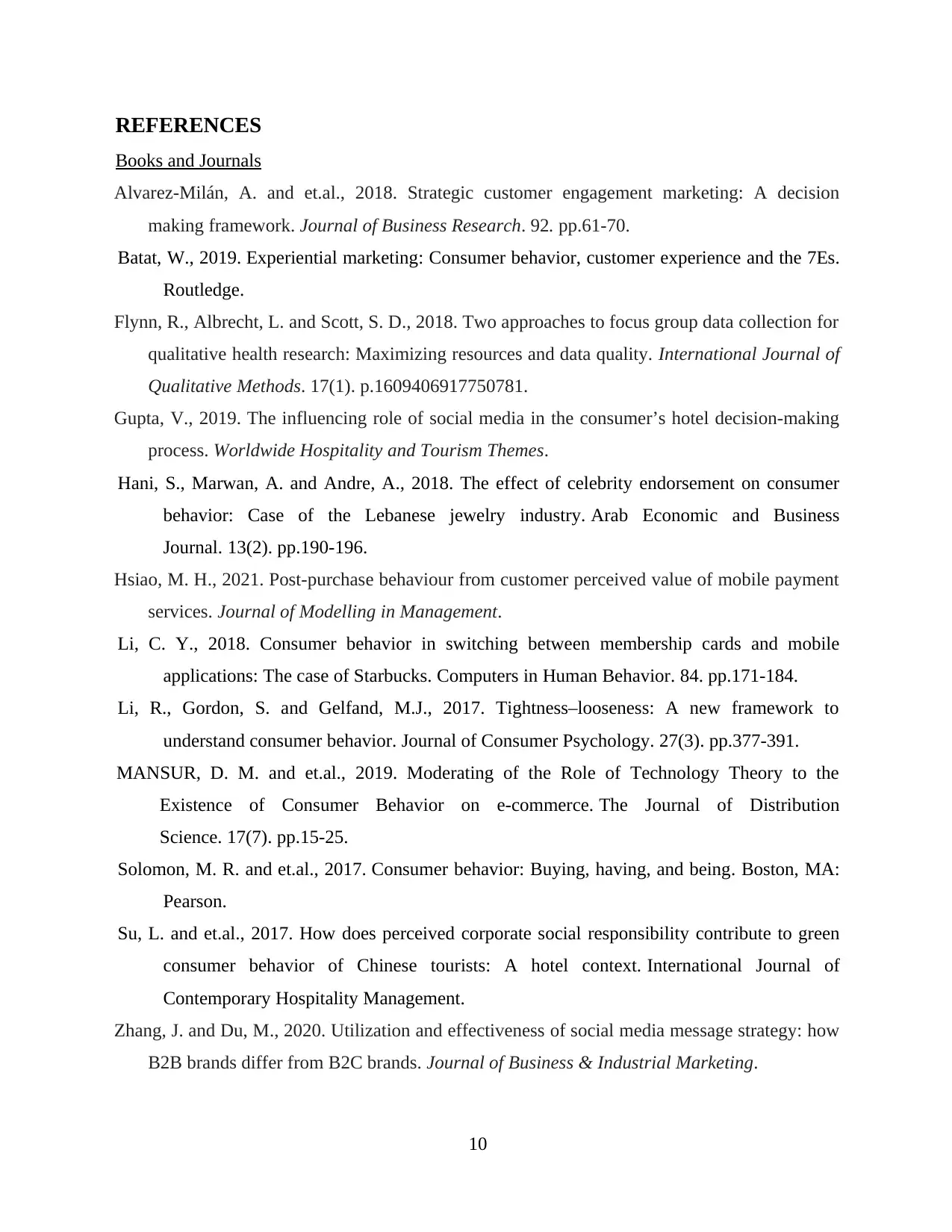
REFERENCES
Books and Journals
Alvarez-Milán, A. and et.al., 2018. Strategic customer engagement marketing: A decision
making framework. Journal of Business Research. 92. pp.61-70.
Batat, W., 2019. Experiential marketing: Consumer behavior, customer experience and the 7Es.
Routledge.
Flynn, R., Albrecht, L. and Scott, S. D., 2018. Two approaches to focus group data collection for
qualitative health research: Maximizing resources and data quality. International Journal of
Qualitative Methods. 17(1). p.1609406917750781.
Gupta, V., 2019. The influencing role of social media in the consumer’s hotel decision-making
process. Worldwide Hospitality and Tourism Themes.
Hani, S., Marwan, A. and Andre, A., 2018. The effect of celebrity endorsement on consumer
behavior: Case of the Lebanese jewelry industry. Arab Economic and Business
Journal. 13(2). pp.190-196.
Hsiao, M. H., 2021. Post-purchase behaviour from customer perceived value of mobile payment
services. Journal of Modelling in Management.
Li, C. Y., 2018. Consumer behavior in switching between membership cards and mobile
applications: The case of Starbucks. Computers in Human Behavior. 84. pp.171-184.
Li, R., Gordon, S. and Gelfand, M.J., 2017. Tightness–looseness: A new framework to
understand consumer behavior. Journal of Consumer Psychology. 27(3). pp.377-391.
MANSUR, D. M. and et.al., 2019. Moderating of the Role of Technology Theory to the
Existence of Consumer Behavior on e-commerce. The Journal of Distribution
Science. 17(7). pp.15-25.
Solomon, M. R. and et.al., 2017. Consumer behavior: Buying, having, and being. Boston, MA:
Pearson.
Su, L. and et.al., 2017. How does perceived corporate social responsibility contribute to green
consumer behavior of Chinese tourists: A hotel context. International Journal of
Contemporary Hospitality Management.
Zhang, J. and Du, M., 2020. Utilization and effectiveness of social media message strategy: how
B2B brands differ from B2C brands. Journal of Business & Industrial Marketing.
10
Books and Journals
Alvarez-Milán, A. and et.al., 2018. Strategic customer engagement marketing: A decision
making framework. Journal of Business Research. 92. pp.61-70.
Batat, W., 2019. Experiential marketing: Consumer behavior, customer experience and the 7Es.
Routledge.
Flynn, R., Albrecht, L. and Scott, S. D., 2018. Two approaches to focus group data collection for
qualitative health research: Maximizing resources and data quality. International Journal of
Qualitative Methods. 17(1). p.1609406917750781.
Gupta, V., 2019. The influencing role of social media in the consumer’s hotel decision-making
process. Worldwide Hospitality and Tourism Themes.
Hani, S., Marwan, A. and Andre, A., 2018. The effect of celebrity endorsement on consumer
behavior: Case of the Lebanese jewelry industry. Arab Economic and Business
Journal. 13(2). pp.190-196.
Hsiao, M. H., 2021. Post-purchase behaviour from customer perceived value of mobile payment
services. Journal of Modelling in Management.
Li, C. Y., 2018. Consumer behavior in switching between membership cards and mobile
applications: The case of Starbucks. Computers in Human Behavior. 84. pp.171-184.
Li, R., Gordon, S. and Gelfand, M.J., 2017. Tightness–looseness: A new framework to
understand consumer behavior. Journal of Consumer Psychology. 27(3). pp.377-391.
MANSUR, D. M. and et.al., 2019. Moderating of the Role of Technology Theory to the
Existence of Consumer Behavior on e-commerce. The Journal of Distribution
Science. 17(7). pp.15-25.
Solomon, M. R. and et.al., 2017. Consumer behavior: Buying, having, and being. Boston, MA:
Pearson.
Su, L. and et.al., 2017. How does perceived corporate social responsibility contribute to green
consumer behavior of Chinese tourists: A hotel context. International Journal of
Contemporary Hospitality Management.
Zhang, J. and Du, M., 2020. Utilization and effectiveness of social media message strategy: how
B2B brands differ from B2C brands. Journal of Business & Industrial Marketing.
10
⊘ This is a preview!⊘
Do you want full access?
Subscribe today to unlock all pages.

Trusted by 1+ million students worldwide
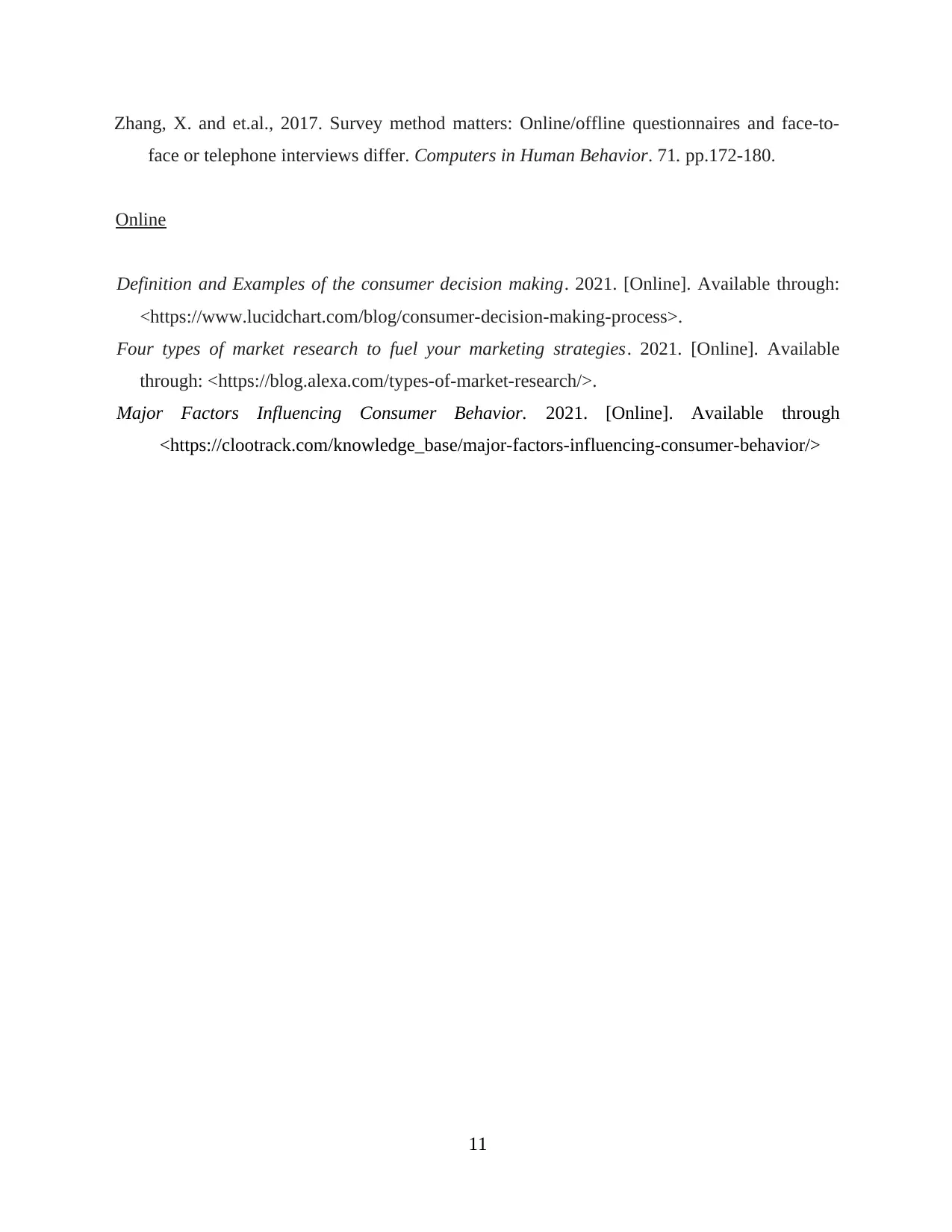
Zhang, X. and et.al., 2017. Survey method matters: Online/offline questionnaires and face-to-
face or telephone interviews differ. Computers in Human Behavior. 71. pp.172-180.
Online
Definition and Examples of the consumer decision making. 2021. [Online]. Available through:
<https://www.lucidchart.com/blog/consumer-decision-making-process>.
Four types of market research to fuel your marketing strategies. 2021. [Online]. Available
through: <https://blog.alexa.com/types-of-market-research/>.
Major Factors Influencing Consumer Behavior. 2021. [Online]. Available through
<https://clootrack.com/knowledge_base/major-factors-influencing-consumer-behavior/>
11
face or telephone interviews differ. Computers in Human Behavior. 71. pp.172-180.
Online
Definition and Examples of the consumer decision making. 2021. [Online]. Available through:
<https://www.lucidchart.com/blog/consumer-decision-making-process>.
Four types of market research to fuel your marketing strategies. 2021. [Online]. Available
through: <https://blog.alexa.com/types-of-market-research/>.
Major Factors Influencing Consumer Behavior. 2021. [Online]. Available through
<https://clootrack.com/knowledge_base/major-factors-influencing-consumer-behavior/>
11
1 out of 13
Related Documents
Your All-in-One AI-Powered Toolkit for Academic Success.
+13062052269
info@desklib.com
Available 24*7 on WhatsApp / Email
![[object Object]](/_next/static/media/star-bottom.7253800d.svg)
Unlock your academic potential
© 2024 | Zucol Services PVT LTD | All rights reserved.

